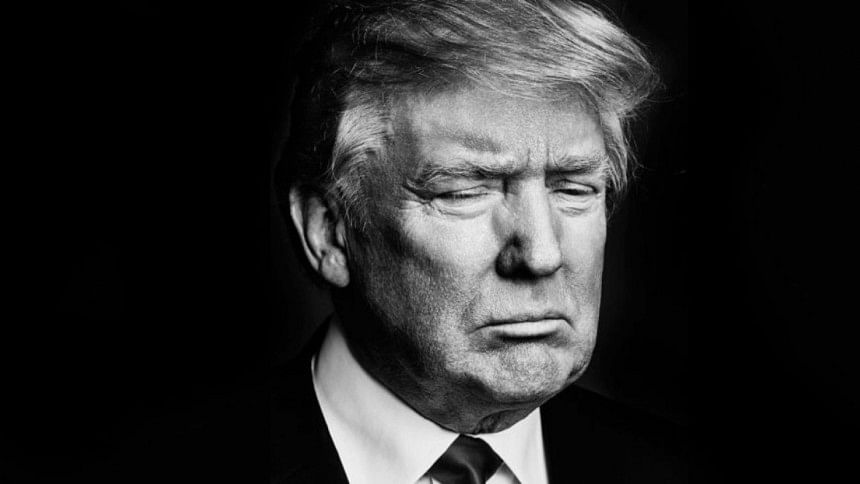TRUMP WINS: America gazed long into an abyss and the abyss is now gazing back into it

A Trump win is no longer the stuff of dark comedy. The propaganda signals, that Donald Trump seems to have been receiving from Planet Mongo through an implanted electrode, have swept America away. Lies, piled upon more lies that became too much even for the most equable of us, won.
Trump, whose contempt for the democratic processes is matched only by the deep contempt he has for all who mistake his contempt for the American experiment for their deep disappointment in it, is poised to become the leader of the free world. The loutish reality TV star-turned-politician, who measured the intelligence of his fellow citizens and citizens of the world by his heavily leveraged net worth and found them riotously lacking, has defeated a candidate who had eight years of experience as First Lady, eight more as a senator for the state of New York and four as secretary of state and a lifelong commitment towards improving the conditions of ordinary Americans.
Now that the sickening charade of his campaign is over, it is a good time to ask what exactly he would be like as the President of the United States. Will his presidency be like his campaign? Will he start with issuing executive orders on important matters, an idea inspired by Reagan's first week in the White House? Can Trump renounce the Paris Agreement on greenhouse-gas emission, just like George Bush, in 2002, "unsigned" US support for the International Criminal Court? Will he re-start exploitation of the Keystone pipeline, suspend the Syrian refugee programme, direct the Department of Commerce to bring trade cases against China and relax background checks to loosen restrictions on gun purchases as he talked about on the campaign trail?
The Donald has already altered the chemistry of international politics far beyond the campaign. After seventy years of American efforts to stop the proliferation of nuclear weapons, he has suggested that South Korea and Japan might be wise to develop them. These kinds of statements are having an effect. A number of political leaders, mostly from the very conservative sides of the parties, are openly calling for nuclear weapons.
Back in July, Trump declared that if Baltic members of NATO are attacked, he would decide whether to defend them on the basis of whether they had "fulfilled their obligations to us", infuriating some leaders of that region. The president of Estonia rejected the suggestion that his country has not done its part for NATO. Despite his professed hard line on China, some Chinese officials have concluded that he is a novice who makes hollow threats and would be easier than Hillary to handle. For example, Trump's "America First" policy has been understood in China as the lament of a permissive, weak America.
Trump's language has had the opposite effect of what he intended. He has vowed to "utterly destroy ISIS." But militant organisations are reportedly using his words and image as recruiting materials. Closer to home, his harsh criticism of Mexicans has fuelled the rise of Andrés Manuel López Obrador, a hard-line leftist who has proposed to cut off intelligence ties with the United States.
How alarmed should the world be? It is true that his policy positions are fluid. A lot of people also argue that the checks and balances enshrined in the US Constitution will limit the power of his presidency and he won't be able to govern the way he has been talking. But the checks and balances are, in fact, much weaker than most people assume. As president, Trump will be able to tilt the Supreme Court to the right with one vacancy to fill immediately and possibly three more sitting Justices who are in their late seventies or early eighties. And both chambers of the Congress are controlled by the Republicans.
In the recent years, US Congress has delegated a great deal of power to the President. Presidents have claimed more and more power under the Constitution and Congress has given in. And the judiciary is slow. If a president moves fast, he can get a lot done before the courts can stop him. A recent example of such a situation is Bush's war on terror. The judiciary ultimately put a lot of constraints on Bush but it took a very long time. Despite a complainant Congress, it would, however, be nearly impossible for Trump to repeal Obamacare as many have been dreading. Republicans need sixty votes in the Senate to overcome a Democratic filibuster.
Trump may also be constrained by isolated acts of disobedience by high ranking officials. To combat terrorism, he has said, "You have to take out their families," and use tactics that are "frankly unthinkable" and "a hell of a lot worse than waterboarding." Michael Hayden, a former US Air Force four-star general who served as the Director of CIA and of the NSA has said that senior officers would refuse to carry out such orders. "You are required not to follow an unlawful order."
For about one and a half year, Trump has encouraged everyone to see him as a work in progress. "Everything is negotiable," he famously declared. Is it really? In Trump: Think Like a Billionaire (2004), Trump wrote "The day I realised it can be smart to be shallow was, for me, a deep experience."
Today America and the world seek solace in the imagination that a Trump presidency would be something other than the campaign that created it.
America has survived Bush. Can it survive Trump?
The writer is a member of the Editorial Team.

 For all latest news, follow The Daily Star's Google News channel.
For all latest news, follow The Daily Star's Google News channel. 



Comments